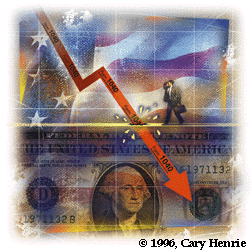


People's first concern is the immediate bottom line: Will this change meanpaying more or less in taxes next year? On the campaign trail, "'Flat' is aproxy for 'simple but also low,'" observes Law School professor JosephIsenbergh. "That's a complete myth." A flat tax, he says, "need not be low, orflat. It could even increase revenue."
Not the plan most voters know. Steve Forbes' proposal-which would have replacedthe current graduated individual and corporate tax rates with a single17-percent rate and a generous personal exemption-meant tax cuts for everyone.It was nearly identical to a bill introduced by House Majority Leader RichardArmey and cosponsored by Senator Richard Shelby, a bill that itself reworks theideas of Stanford economists Robert Hall and Alvin Rabushka.
With one big difference: The Hall-Rabushka flat tax is "revenue neutral,"meaning it changes how the money gets raised, but not the total amount. TheStanford duo believes it's possible to match today's revenues with a 19-percentrate and an exemption that, for a family of four, leaves the first $25,000untaxed-still generous, but far less than Forbes' figure of $36,000. Themagazine publisher's largesse would have created federal budget shortfalls ofanywhere from $40 billion to $200 billion. For that reason, Armey would phasein his tax cut over three years, promising to close the budget gap by cuts inspending.
Forbes offered his own contingency: the supply-side argument that massive taxcuts would stimulate the economy enough to boost tax revenue. Presto-low taxes,no deficit increase. "Yeah, we heard that in the '80s, too," says ElizabethGarrett, a Law School assistant professor. To Garrett, those who dismissedForbes' reasoning as "déjà voodoo" had it right: "In times ofsuch serious budget problems, it's irresponsible to change to a tax system thatraises less money." Siding with her are 82 percent of Americans who, accordingto a January Time/CNN pole, would oppose a flat tax if it added to the budgetdeficit.
Garrett and others consider the Hall-Rabushka plan more realistic. Yet itsbottom-line impact is easily predicted, she says, only for the poor, many ofwhom will owe no tax at all. As income rises, the effects of a flat tax aremuddied by such changes as the elimination of itemized deductions-includingbeloved write-offs like charitable giving and home-mortgage interest-and theend to taxes on savings and investment income. In The Flat Tax (1985 and 1995),Hall and Rabushka admit that, short term, some middle-class families would paymore. That depends heavily, however, on individual circumstances like theamount of investment income. For an upper-middle-class family, estimates AustanGoolsbee, assistant professor at the Graduate School of Business, the price ofsimplicity may be in the ballpark of $500. Still, he points out, "The averagefamily that makes $90,000 is spending $500 on an accountant"-likely an obsoleteneed in a flat-tax world.
And the wealthy? As the ones with the largest share of investment income, theywin out under its new tax-free status. But while they'd probably write smallerchecks to the IRS, the wealthy would also probably declare more salaryearnings, since the flat tax abolishes most tax shelters. The outcome couldmirror that of Reagan's Tax Reform Act of 1986, according to Sherwin Rosen,AM'62, PhD'66, the Edwin A. and Betty L. Bergman distinguished serviceprofessor in economics. After that law, "a lot of loopholes were closed and alot of people started paying taxes, especially rich people. A lot of incomethat was never reported came on the tax rolls."
If the average individual pays less, however, then who gives? Businesses. ToGoolsbee, these reforms are the untold story of the flat tax. Gone would be theByzantine corporate tax that, despite high rates, leaks billions in revenuethrough myriad deductions-what Forbes called the product of politicians andspecial interests "trading loopholes for campaign cash." In its place would bea flat tax on businesses-even unincorporated, mom-and-pop shops-based simply onsales minus purchases, capital investments, and wages and pensions paid.
Removing the current perks and penalties creates new winners and losers.Labor-intensive retailers, for instance, would grouse because they couldn'tdeduct the cost of employee benefits like health insurance. Why should the rankand file care? Because, says Elizabeth Garrett, "businesses don't pay taxes.People do." So a tax hike on business is ultimately borne by customers,employees, or owners and investors. Soak-the-rich conventional wisdom says thelatter should pay, but with pension funds among America's biggest investors,notes Garrett, "increasingly, that's people like you and me."
 The University of Chicago Magazine April 1996
The University of Chicago Magazine April 1996